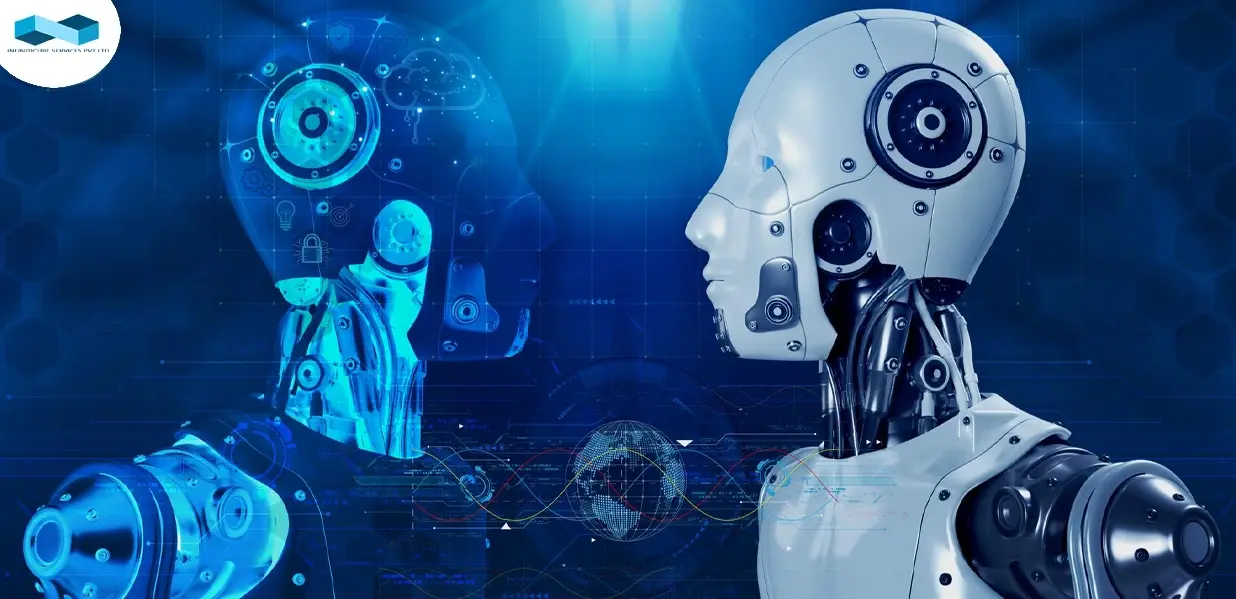The Collaboration of Big Data and DevOps
Today you can find data everywhere, whether you are interacting on social media or doing online transactions, it is flowing at an astonishing rate. But where do we put in use of all this data, and how can we make sense of it that not only benefits businesses but also society as a whole? That’s where Big Data and DevOps come in and play their significant role. They both combined have the potential to shake the way organizations use them.
Hence, in this blog, we'll discuss and explore the outcomes of collaborating these two tech solutions. But first, I need to break down these two concepts for you so that you can get familiar with them.
Big Data- A Quick Overview
You can say Big Data is the modern version of traditional data. Big Data is capable enough to handle large and complex sets of data that traditional data processing methods struggle to handle efficiently.
It includes structured and unstructured data from diverse sources, such as text, images, videos, and sensor data. The unique ability of Big Data is its ability to provide valuable insights and patterns that we lacked in the past. Hence, the modern version of traditional data.
Now, only providing valuable insights and patterns is not only the area where Big Data is capable. Its capacity lies in driving informed decision-making, uncovering hidden trends, and predicting future outcomes.
Businesses analyze Big Data to gain a deeper understanding of customer preferences, optimize operations, detect fraud, and even advance scientific research.
An Overview of DevOps
DevOps (Development and Operations) is a modern approach to software development and delivery that gives importance to collaboration, automation, and continuous improvement.
In traditional software development practices, developers and operations teams often work in silos, leading to communication gaps, inefficiencies, and slower delivery cycles. DevOps aims to break down these barriers by bringing together developers, operations engineers, and other stakeholders to work as a cohesive unit.
At its core, DevOps is about streamlining the software delivery process, from code development and testing to deployment and monitoring. By adopting DevOps practices, organizations can automate repetitive tasks, such as building, testing, and deploying code, freeing up valuable time and resources. This automation not only accelerates the delivery of new features and updates but also improves the reliability, scalability, and security of software applications.
Why Big Data Demands a DevOps Approach
For Big Data, DevOps isn't just a nice-to-have—it's essential for success. Big Data deals with managing and making sense of vast amounts of information from various sources. To tap into its potential, organizations leveraging big data need DevOps.
DevOps, which streamlines software development and IT operations, might seem unrelated to Big Data at first. However, they're closely connected for several reasons:
- Agility and Speed: Big Data aims to extract insights quickly. DevOps practices like automation and continuous integration/delivery (CI/CD) speed up the development and deployment of Big Data applications, ensuring timely insights.
- Scalability and Reliability: Big Data platforms must handle massive data volumes and scale effectively. DevOps principles like infrastructure as code (IaC) and automated provisioning ensure scalability without compromising reliability.
- Collaboration and Communication: Big Data projects involve diverse teams. DevOps fosters collaboration, breaking down silos between teams and promoting shared ownership for project success.
- Continuous Improvement: Big Data evolves rapidly. DevOps encourages continuous innovation, allowing teams to experiment, learn from failures, and enhance Big Data solutions over time.
Challenges of Collaborating Big Data and DevOps
Collaborating Big Data and DevOps offers significant benefits for organizations seeking to maximize their data potential while improving software development and operations. However, there are challenges to navigate when integrating these two domains:
- Complex Data Sources and Formats: Big Data often originates from diverse sources with varying formats, requiring specialized skills and tools to manage and integrate effectively.
- Data Quality and Consistency: Maintaining data quality and consistency amidst large volumes of data from multiple sources is crucial. DevOps practices should include data validation and cleansing processes to ensure accurate analysis.
- Scalability and Performance: Big Data applications must scale horizontally to handle increasing data volumes and processing demands. DevOps teams need to design scalable infrastructure and data pipelines for optimal performance.
- Toolchain Integration: Integrating Big Data tools with existing DevOps toolchains can be complex due to technological differences. DevOps teams must carefully select compatible tools and establish seamless workflows for data pipeline orchestration and deployment.
- Security and Compliance: Big Data environments store sensitive information, necessitating robust security measures and compliance with regulatory requirements. DevOps teams should implement access controls, encryption, and auditing to protect data privacy.
- Cultural and Organizational Challenges: Adopting a collaborative DevOps culture may face resistance in organizations accustomed to traditional structures. Overcoming cultural barriers and bridging skills gaps between data and DevOps teams are vital for success.
- Monitoring and Troubleshooting: Effective monitoring tools and practices are essential for detecting and resolving issues in Big Data applications and infrastructure in real-time.
- Cost Management: Building and maintaining Big Data infrastructure can be costly, necessitating optimization of resource utilization and continuous evaluation of ROI to ensure cost-effectiveness.
The Strategic Advantages of Big Data And DevOps Fusion
Symboisis of Big Data with DevOps practices offer numerous benefits that can greatly impact businesses' operations and success. Here are some key advantages:
- Enhanced Decision-Making: By using Big Data analytics within a DevOps framework, organizations gain valuable insights for informed decision-making across various business aspects such as product development, marketing strategies, and customer service improvements.
- Faster Time-to-Market: DevOps practices like automation and continuous delivery speed up software updates and new feature deployments. Applied to Big Data projects, this means quicker deployment of data pipelines and analytics models, giving businesses a competitive edge.
- Improved Collaboration and Efficiency: DevOps fosters better communication and alignment between development, operations, and data teams. Breaking down silos enhances efficiency, reduces bottlenecks, and promotes shared responsibility across teams.
- Scalability and Resilience: DevOps practices enable scalable and resilient infrastructure for Big Data applications, ensuring optimal performance and cost-effectiveness based on demand.
- Continuous Improvement: DevOps' iterative approach allows teams to experiment and refine Big Data solutions over time, driving innovation and optimization through feedback loops and performance metrics analysis.
- Cost Savings: Automation, optimized resource utilization, and reduced time-to-market lead to significant cost savings, whether through decreased infrastructure costs, improved operational efficiency, or increased revenue from faster insights and innovation.
Critical Applications of DevOps in Big Data Infrastructure
In Big Data, where vast amounts of data are handled, DevOps practices are crucial for ensuring efficiency, scalability, and reliability. Here's how DevOps is applied in Big Data contexts:
- Automated Data Pipeline Orchestration: DevOps enables automation of data pipeline orchestration, streamlining processes like data ingestion, processing, and transformation. This automation enhances data delivery speed, reduces errors, and improves pipeline reliability.
- Continuous Integration and Deployment (CI/CD) of Data Applications: DevOps allows for CI/CD pipelines for data applications, automating testing, building, and deployment. This ensures quick and reliable delivery of new features and updates, minimizing downtime and speeding up time-to-market.
- Infrastructure as Code (IaC) for Scalable Data Processing: DevOps promotes treating infrastructure as code, enabling dynamic provisioning, configuration, and scaling of resources based on workload demands. This scalability ensures efficient handling of growing data volumes and fluctuating workloads without manual intervention.
- Automated Monitoring and Alerting for Data Operations: DevOps advocates for automated monitoring and alerting systems to detect and respond to issues in real-time. In Big Data, this involves monitoring metrics related to data processing, storage, and analytics, allowing proactive identification and resolution of performance issues.
- Infrastructure Resilience and Disaster Recovery: DevOps focuses on building resilient infrastructure architectures for Big Data, including redundant systems, data replication, and disaster recovery strategies. This ensures data availability and integrity, minimizing data loss and maintaining business continuity during failures or disruptions.
Conclusion
To sum up, the fusion of Big Data and DevOps marks a revolutionary partnership that can reshape how organizations function, innovate, and compete in the data-centric landscape. By integrating Big Data analytics into DevOps practices, businesses can access valuable insights, empower decision-making, and expedite the delivery of data-driven solutions.
Throughout this discussion, we've explored the combined benefits, challenges, and crucial applications of Big Data and DevOps. From improved decision-making and faster deployments to enhanced collaboration and resilient infrastructure, this integration offers numerous advantages for organizations navigating the digital era.
As you embark on your journey to leverage their potential, always remember the importance of fostering a culture of continuous improvement, collaboration, and innovation. With Infiniticube's expertise in Big Data and DevOps services, you can stay ahead of the curve and seize new opportunities for growth and competitiveness in today's dynamic market.
Reach out to us today to discover how Infiniticube can assist you in harnessing cutting-edge software development solutions. Together, we can transform your data into a strategic asset and unlock its full potential for innovation and success.
 June 27, 2025
June 27, 2025
 Balbir Kumar Singh
Balbir Kumar Singh
 0
0
 June 13, 2025
June 13, 2025
 Balbir Kumar Singh
Balbir Kumar Singh
 0
0









Leave a Reply